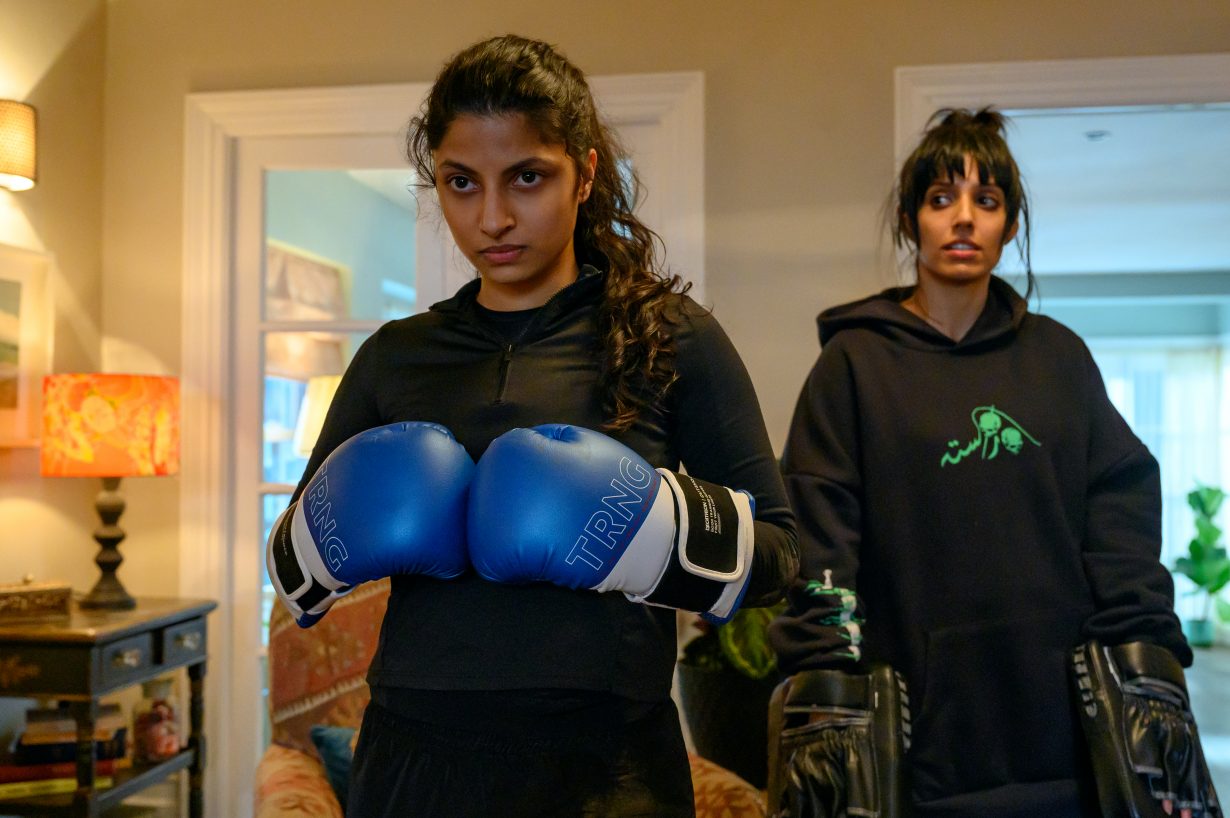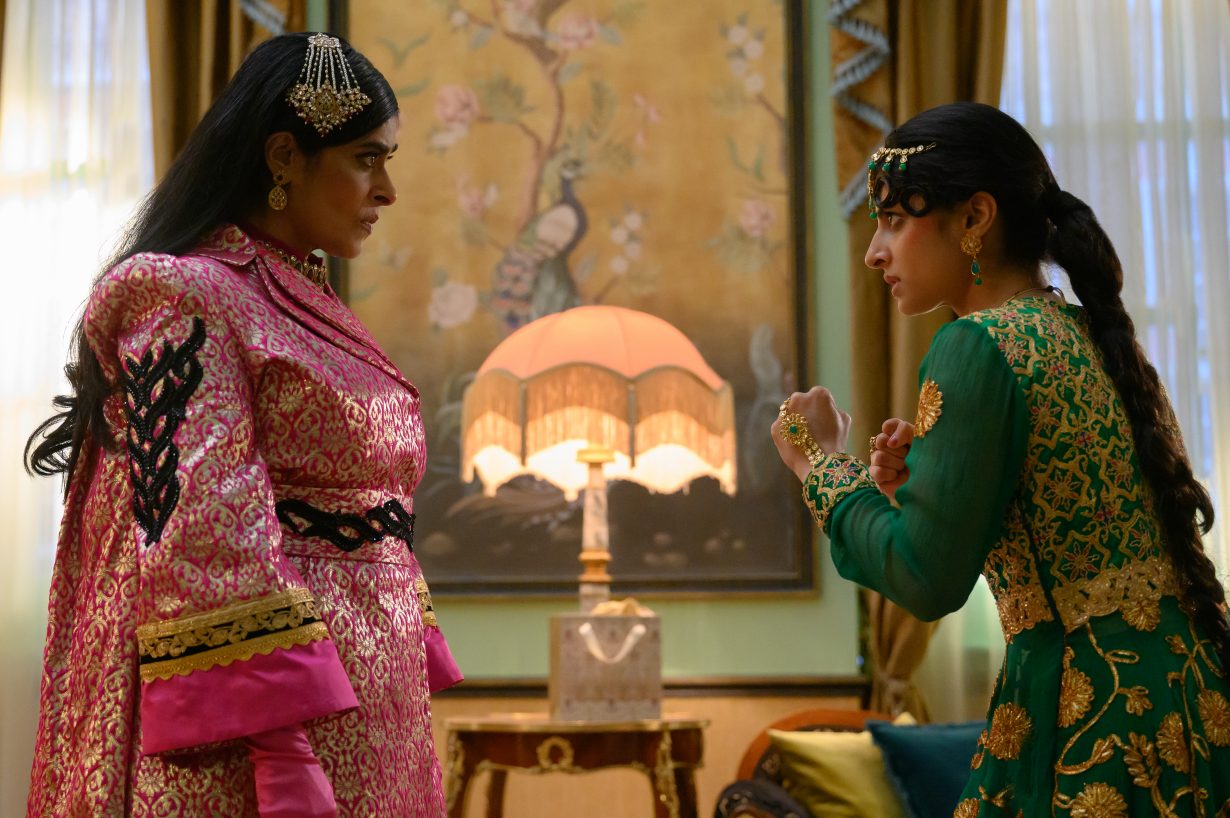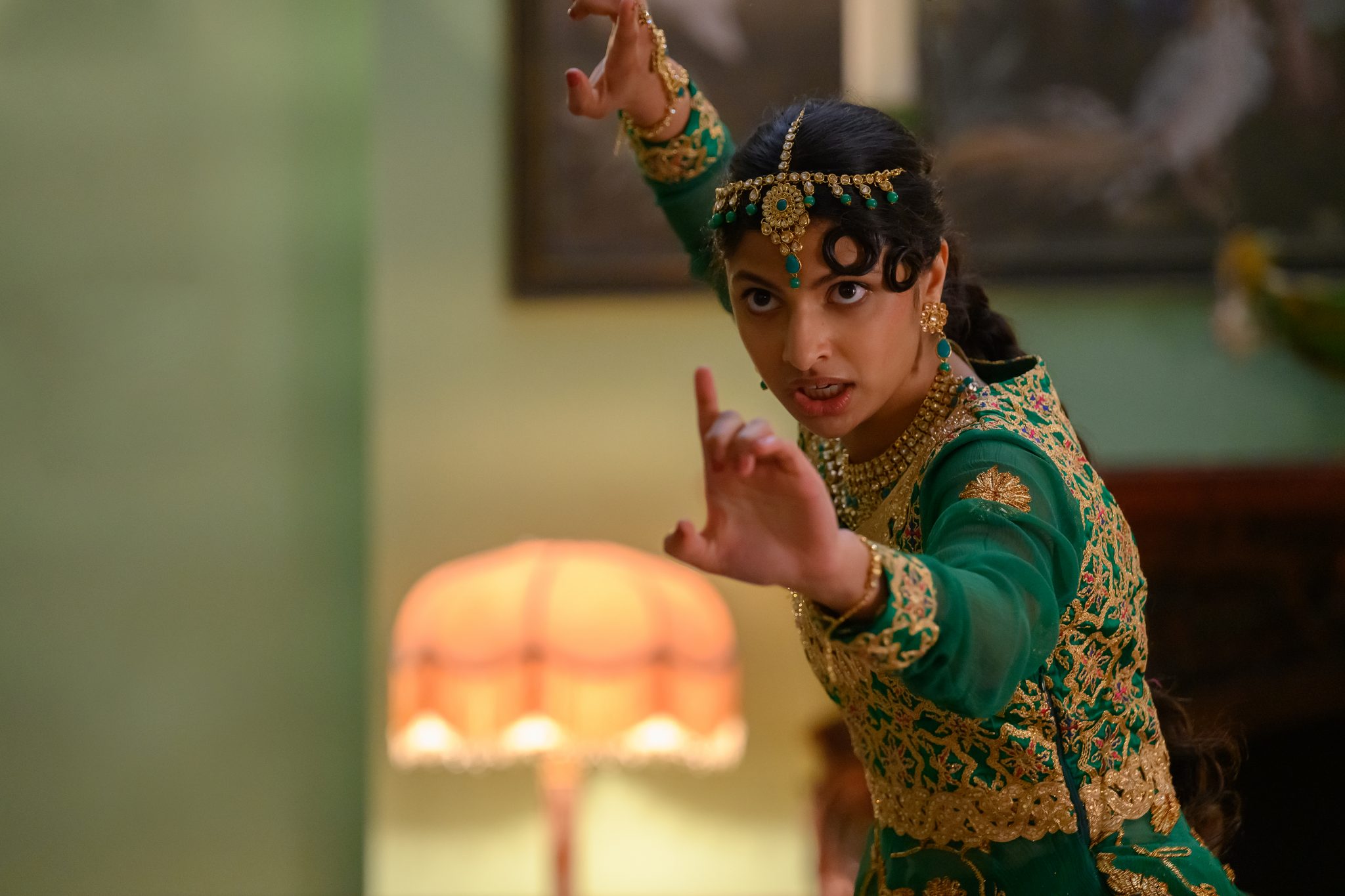From fly-kicking mothers-in-law to horror-hippodrome weddings, Nida Manzoor’s new film unravels malignant generational forces with satire and self-awareness
Salim Shah, a doctor, the neighbourhood favourite, is the sharp-jawed love-interest in director Nida Manzoor’s Polite Society (2023). He’s what people around him call a ‘catch’. He’s also a mama’s boy. Raheela, the mama in question, strokes his face and whispers in his ear to soothe him at parties when he gets anxious; the two lie in a tangle on the sofa, arms interlocked, while watching TV. There’s no father – maybe he’s dead – and thus the story is ripe with Oedipal markers. Mother and son, codependent, a little sinister, live together in an enormous house, in what looks like the same set as the one in Downton Abbey.
Polite Society is set within a London community of British Pakistanis; part thriller, part family drama, and a marriage plot-meets-coming-of-age (a classic combination). The film begins with a glitzy Eid party at the Shah family home. All the eligible girls in the neighbourhood have been invited; everyone’s in their best outfits. Later we find out that hidden devices in the flower arrangements have assessed the girls’ fertility as they walked in.
The marriage plot can take on gruesome proportions in South Asian family structures, and while Manzoor begins the story with the stereotypical cues – controlling mothers, arranged marriages, girls-gone-rogue – the film moves quickly past them into its own exegesis and, importantly, humour. The plot is so self-aware that it sometimes even slackens into slapstick parody. While Salim is the love interest, the movie’s protagonists are a pair of sisters – Ria and Lena Khan – who are angry and inseparable. They like to pick fights, beat each other up, listen to loud punk music and headbang with their hair untied.

The first time we see Salim he is perched on a velvet sofa by a roaring fireplace, surrounded by the ladies at the Eid party, as they fawn over his silly jokes. Hothead wannabe-stuntwoman Ria, the younger sister, looks on with a scowl, ice clinking in her tumbler while Salim hits it off with Lena. Ria isn’t subscribing to the heteronormative fantasy peddled by the older women in the film – the mothers, mostly – not for one minute. For starters, she makes stunt-trick videos in her free time, and she needs her sister around to film them. She is religious about her karate classes and bounces around the punching bag in her room for hours, jabbing. In lieu of a diary she writes to Eunice Huthart – Angelina Jolie’s stunt double – sending her special clips of fast-paced ju-jitsu sequences and backflips off the wall. Lena’s just dropped out of art school and Ria wants her to go back; she pulls out her broken, discarded canvases from the trash. “My sister is an artist,” she says over and over again. To her, the pair, artist and fighter, are embarked upon a heavenly mandate, joined in a typical us-against-the-world battle, and men only get in the way of that.
Ria comes home one day to find the family in the sitting room, a ring shining on Lena’s finger. Moments later she is scaling walls to plant dirty evidence in Salim’s bedroom and visiting – in a bushy stick-on handlebar moustache – his gym to hack his laptop in an elaborate interference plan involving her two best friends. Salim picks Lena up in his sports car; Ria fumes at her bedroom window. She is dead set on sabotaging this wedding. Enter Raheela.

To her, the incoming wife is a womb, a vessel to carry lineage, and she will obliterate anything that comes in the way of this fantasy of the future. Raheela and Ria are mirror images in their ambition, straddling a generational divide, the first a South Asian woman of the past, Ria new-gen: to her, men are arbitrary and marriage is defunct. As Salim Weds Lena, things come to boil, and the wedding is a horror hippodrome: Ria glowers furiously during her Bollywood dance sequence (the hook of the song directly translating to ‘you have killed me’), gunshots ring in the air, an army of zombielike guests flood the scene and the jewellery and lighting are so garish that each sequence is made immediately shinier, more histrionic.
The family unit in Polite Society is not driven by the patricidal impulse of Oedipus, as Salim and Raheela’s relationship might suggest, but rather by a slow unravelling of a very particular alchemy of malignant forces – patriarchal, religious, generational – that come together to produce a terrifying conglomerate of power and control: the South Asian Mother of a Son (let’s call them SAMS). Raheela is manipulative, calculating and cruel, and should it come to it, she can leap off the ground in a swift flying kick. “You could never know what I gave up for that boy… what I did to shape and fashion him,” she thunders over Ria.“Behind every great man is a very tired mother, who has sacrificed everything for her beautiful boy.” But the real kick is that her beautiful boy grows more redundant as the film progresses; the marriage isn’t even really about him.
The big twist (spoiler alert) is that the object of Raheela’s desire is the perfect womb in which to incubate her own clone; Salim, it turns out, had a first wife who died in a previous attempt. With this, Manzoor reaches for the jugular: SAMS will style their sons into their own image, but this renders them so weak and dependent that, in the end, SAMS are thoroughly disappointed by their creations. All of the men in Manzoor’s film eventually become little more than props. Raheela’s self-replicating obsession is textbook Lacanian: in ‘The Mirror Stage as Formative of the Function of the I as Revealed in Psychoanalytic Experience’ (1949), the French psychoanalyst writes of how the child’s idealised version of itself is in fact an idealised version of its mother; but a mother carries her own injury, a narcissistic injury that is inflicted on her by the child’s entry into the symbolic order. Raheela’s desire is to be restored, to start again, to be perfect, to undo the compromises that her beautiful boy forced upon her.
‘It wouldn’t be worth it if I just went and wrote some honor-killing thing with some bro,’ Manzoor said to The New Yorker, sharply turning away from what is expected of her as a Muslim woman and filmmaker. Polite Society is about the patriarchy, but its lens is specific: it examines, above all, the complicity of women in the ill treatment of other women. ‘Like, who doesn’t want to fight somebody at a Desi wedding?’ Priya Kansara, who plays Ria, says to The Guardian. ‘Haven’t we all wanted to kick an aunty in the face at one point?’
